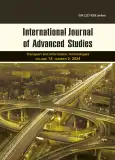Technological Design of Car Service Stations using Genetic Algorithms
- Authors: Zakharov N.S.1, Kozin E.S.1
-
Affiliations:
- Industrial University of Tyumen
- Issue: Vol 14, No 2 (2024)
- Pages: 104-122
- Section: Articles
- Published: 30.06.2024
- URL: https://bakhtiniada.ru/2328-1391/article/view/299631
- DOI: https://doi.org/10.12731/2227-930X-2024-14-2-296
- EDN: https://elibrary.ru/BPCUNW
- ID: 299631
Cite item
Full Text
Abstract
The study describes the use of evolutionary methods or genetic algorithms for the technological design of newly constructed or modernized car service stations. Genetic algorithms are one of the types of machine learning models and are actively used to solve multifactor optimization problems. A task of this type is to search for the technical parameters of a car service enterprise under which the economic indicators of its activities will correspond to the profit or capital cost restrictions set by the user. The paper presents the parameters of the developed model, fitness functions, and also provides an assessment of the effectiveness of using the method of genetic algorithms relative to the method of simply enumerating different options for combinations of initial factors.
Purpose. Increasing the efficiency of management of road transport enterprises by using the method of genetic algorithms for strategic planning tasks.
Methodology. The research uses the method of genetic algorithms to solve a multi-criteria reverse optimization problem in the technological design of a car service station
Results. The use of the method of genetic algorithms for the design of service stations and enterprises for the maintenance and repair of vehicles is justified, taking into account the restrictions or targets established at the beginning of the design.
Practical implications. The results of the research can be used by the management of enterprises for the maintenance and repair of vehicles in their technological design, strategic planning of activities and modernization.
Keywords
About the authors
Nikolay S. Zakharov
Industrial University of Tyumen
Email: zakharovns@tyuiu.ru
Head of the Department of Car Service and Technological Machines, Doctor of Technical Sciences, Professor
Russian Federation, 38, Volodarsky Str., Tyumen, 625000, Russian FederationEvgeniy S. Kozin
Industrial University of Tyumen
Author for correspondence.
Email: kozines@tyuiu.ru
Associate Professor of the Department of Car Service and Technological Machines, Candidate of Technical Sciences, Associate Professor
Russian Federation, 38, Volodarsky Str., Tyumen, 625000, Russian FederationReferences
- Karagodin V.I. Effekt ot ucheta vzaimosvyazi proizvodstvennykh uchastkov pri proektirovanii stantsii tekhnicheskogo obsluzhivaniya avtomobiley [The effect of taking into account the relationship of production areas when designing a car service station]. Avtotransportnoe predpriyatie, 2015, no. 2, pp. 21-24.
- Kozin E.S. Sistema podderzhki prinyatiya resheniy po upravleniyu stantsiey tekhnicheskogo obsluzhivaniya avtomobiley [Decision support system for car service station management]. Transport Urala, 2022, no. 3 (74), pp. 73-77.
- Lyalin, K.V. Tekhnologicheskiy raschet i planirovka stantsiy tekhnicheskogo obsluzhivaniya avtomobiley: uchebnoe posobie [Technological calculation and planning of car service stations]. Ekaterinburg: RGPPU, 2019, 124 p.
- Sokolova, A.V. Obosnovanie moshchnosti dorozhnoy stantsii tekhnicheskogo obsluzhivaniya avtomobiley [Justification of the capacity of a road vehicle maintenance station]. Transport. Transportnye sooruzheniya. Ekologiya, 2020, no. 4, pp. 5-14.
- Adomavicius G. et al. Workshop on Context-Aware Recommender Systems 2023. Proceedings of the 17th ACM Conference on Recommender Systems, 2023, pp. 1234-1236. https://doi.org/10.1609/aimag.v32i3.2364
- Antuori V. et al. Combining Monte Carlo tree search and depth first search methods for a car manufacturing workshop scheduling problem. International Conference on Principles and Practice of Constraint Programming, 2021. https://doi.org/10.4230/LIPIcs.CP.2021.14
- Baturu C. et al. Brute force algorithm implementation of dictionary search. Jurnal Info Sains: Informatika dan Sains, 2020, vol. 10, no. 1, pp. 24-30. http://ejournal.seaninstitute.or.id/index.php/InfoSains
- Chan T. C. Y., Mahmood R., Zhu I. Y. Inverse optimization: Theory and applications. Operations Research, 2023. https://arxiv.org/abs/2109.03920
- Fayziyev P. R. et al. Organization of technological processes for maintenance and repair of electric vehicles. International Journal of Advance Scientific Research, 2022, vol. 2, no. 03, pp. 37-41. https://doi.org/10.37547/ijasr-02-03-06
- Fu C. et al. A two-stage robust approach to integrated station location and rebalancing vehicle service design in bike-sharing systems. European Journal of Operational Research, 2022, vol. 298, no. 3, pp. 915-938. https://doi.org/10.1016/j.ejor.2021.06.014
- Gössling S., Kees J., Litman T. The lifetime cost of driving a car. Ecological Economics, 2022, vol. 194, pp. 107335. https://doi.org/10.1016/j.ecolecon.2021.107335
- Hong J., Kim B., Oh S. The relationship benefits of auto maintenance and repair service: A case study of Korea. Behavioral Sciences, 2020, vol. 10, no. 7, pp. 115. https://doi.org/10.3390/bs10070115
- Ikromov I. A., Abduraximov A. A., Fayzullayev H. Experience and prospects for the development of car service in the field of car maintenance. ISJ Theoretical & Applied Science, 2021, vol. 11, no. 103, pp. 344-346. https://doi.org/10.15863/TAS.2021.11.103.25
- Jain N. K., Singh A. K., Kaushik K. Evaluating service quality in automobile maintenance and repair industry. Asia Pacific Journal of Marketing and Logistics, 2020, vol. 32, no. 1, pp. 117-134. https://doi.org/10.1108/APJML-07-2018-0277
- Katoch S., Chauhan S. S., Kumar V. A review on genetic algorithm: past, present, and future. Multimedia tools and applications, 2021, vol. 80, pp. 8091-8126. https://doi.org/10.1007/s11042-020-10139-6
- Lambora A., Gupta K., Chopra K. Genetic algorithm-A literature review. 2019 international conference on machine learning, big data, cloud and parallel computing (COMITCon). IEEE, 2019, pp. 380-384. https://doi.org/10.1109/COMITCon.2019.8862255
- Liu P., Wang G., Su P. Optimal maintenance strategies for warranty products with limited repair time and limited repair number. Reliability Engineering & System Safety, 2021, vol. 210, pp. 107554. https://doi.org/10.1016/j.ress.2021.107554
- Papadimitriou D., Li J. Constraint Inference in Control Tasks from Expert Demonstrations via Inverse Optimization. 2023 62nd IEEE Conference on Decision and Control (CDC). IEEE, 2023, pp. 1762-1769. https://arxiv.org/abs/2304.03367
- Turoń K., Kubik A. Economic aspects of driving various types of vehicles in intelligent urban transport systems, including car-sharing services and autonomous vehicles. Applied Sciences, 2020, vol. 10, no. 16, pp. 5580. https://doi.org/10.3390/app10165580
- Wang Z. Z., Sobey A. A comparative review between Genetic Algorithm use in composite optimisation and the state-of-the-art in evolutionary computation. Composite Structures, 2020, vol. 233, pp. 11173. https://doi.org/10.1016/j.compstruct.2019.111739
- Wuttikun K. et al. Service Station Modelling Through Enterprise Architecture: Business Intelligence and Customer Engagement of Top Service Stations in Thailand. 2021 5th National Conference on Advances in Enterprise Architecture (NCAEA). 2021. https://doi.org/10.1109/NCAEA54556.2021.9690506
Supplementary files










